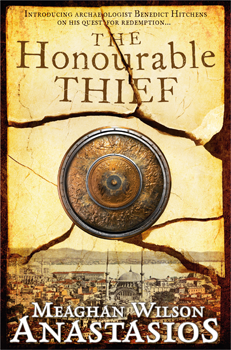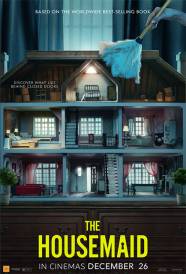The Honourable Thief

The Honourable Thief is Meaghan Wilson Anastasios' first solo novel.
'Achilles? Because...?'
'Obsession of mine. Half man, half god - and his own worst enemy.
My kind of man.' He laughed.
Istanbul, Turkey 1955
Benedict Hitchens, once a world-renowned archaeologist, is now a discredited - but still rather charming - shell of his former self. Once full of optimism and adventure, his determination to prove that Achilles was a real historical figure led him to his greatest love, Karina, on the island of Crete and to his greatest downfall, following the disappearance of an enigmatic stranger, Eris.
He has one last chance to restore his reputation, solve the mystery of Eris and prove his Achilles theory. But it is full of risk, and possibly fatal consequences...
In her breakout novel, Meaghan Wilson Anastasios weaves an action-packed tale of honour, passion, heroes and thieves across an epic backdrop of history.
Meaghan Wilson Anastasios spent her formative years in Melbourne before travelling and working as an archaeologist in the Mediterranean and Middle East. She holds a PhD in art history and cultural economics, has been a lecturer at the University of Melbourne and was a fine art auctioneer. Meaghan now uses her expertise to write and research for film and TV. She lives in inner-city Melbourne with her husband and their two children. The Water Diviner was her first novel, which she co-wrote with her husband Andrew. The Honourable Thief is her first solo novel.
The Honourable Thief
Pan Macmillan
Author: Meaghan Wilson Anastasios
ISBN: 9781760552626
RRP: $29.99
Interview with Meaghan Wilson Anastasios
Question: What inspired you to write The Honourable Thief?
Meaghan Wilson Anastasios: Ever since I first read about the peculiar case of the archaeologist, James Mellaart, whose career in Turkey came to an end when he was accused of involvement in an antiquities smuggling ring by Turkish police, my mind has been busily concocting a story about a brilliant man brought low by hubris and blind faith in his own inviolability.
Enter Dr Benedict Hitchens, whose life has been evolving in my imagination for years, along with that of my other major character – Eris Patras – who plays a key role in this book and attains level pegging with Benedict in my second book in the series, The Emerald Tablet. In a way, their world is my world, notwithstanding their expeditions into morally dubious and outright illegal activities.
I've assumed many guises over the years – as an archaeologist, an academic, and an art valuer. Yes, I know. It does look as if I planned my life based on the first page of a career guidance pamphlet, particularly when you consider that I'm now an 'author'. That aside, I found myself immersed in some extraordinary worlds and I wanted to conceive a story where all my interests and experiences could converge.
As for the setting, well, there was no choice. My abiding love for Turkey compelled me to write The Honourable Thief. Whether it knows it or not, it's become my second home, and the opportunity to share a glimpse of such a special place was irresistible.
Question: Can you talk about the research you conducted prior to writing The Honourable Thief?
Meaghan Wilson Anastasios: I had a good foundation of knowledge before I embarked on my manuscript, because the plot was based on my background in archaeology and classical studies, coloured by my real-life experiences in the world of art auctions and research into antiquities theft and art forgery. So I was in the enviable position of having a pretty good base to build on before I started.
To an extent, though, that's where the real work began. For instance: yes, I know Istanbul better than I know Sydney. But what on earth did it look like in the 1950s? Just as a small example of what I had to research - what was going on with the Turkish telecommunications industry at the time? Was it possible to make an international phone call? I was determined to make The Honourable Thief as accurate as possible, and so I sought out as much information as I could about life in Turkey in the 1950s. Which isn't to say that I didn't inevitably skip over, or choose to ignore, some things. I'm just waiting for the Facebook post from a reader that points out that ferry travel between the Greek island of Lesvos and the Turkish coast wasn't possible in 1955! But I hope my readers will allow me some latitude and suspend their disbelief for some of the small things I let slip through for the sake of plot.
The material I was least familiar with related to the experiences of the Greeks residents of the island of Crete during the German occupation in the Second World War. The harrowing accounts of survivors and tales of heroism moved me deeply. It's one of the many reasons I found writing The Honourable Thief such a rewarding experience; I had a very plausible reason to immerse myself in extraordinary true stories.
Question: What do you hope readers take from The Honourable Thief?
Meaghan Wilson Anastasios: Reading a book is a massive commitment, and the thought that readers have chosen to join me on what I hope is an enjoyable and exciting adventure is truly humbling. So, most of all, I hope The Honourable Thief proves worthy of their vote of confidence.
The worlds depicted in The Honourable Thief are ones I know and love, and the characters that occupy them are now as close to me as if they were made of flesh and blood. I hope I have done them justice and that when readers turn that last page, they're keen to embark with me on our next adventure.
I've also always believed that the best way to teach people about history is to do so by stealth. I hope that readers take away with them an understanding of the beautiful chaos and complexity of society that has existed for as long as human beings have been treading the planet, and that we learn as much about who we are by studying the past as we do by looking at the present. If more people were willing to take their lead from the lessons imparted by history, the world today would a much better place.
Question: How much of your inspiration comes from real life and real people?
Meaghan Wilson Anastasios: The real life experiences of archaeologist, James Mellaart, and writer, fabulist and wartime freedom fighter, Sir Patrick Leigh 'Paddy' Fermor, provided the springboard for key moments in Benedict Hitchens' life on Crete and in Turkey. Paddy Fermor, who I would give good money to have had the privilege of meeting in person, was quite a man. Described as 'a dangerous mix of sophistication and recklessness' by his housemaster after the young Paddy was expelled from school, he went on to fight with the Greek Resistance on Crete during the Second World War and later became an erudite, precociously clever and celebrated travel writer. I think he and I would have got along famously.
James Mellaart, who was at one point the most lauded archaeologist on the planet, is an intriguing character. Like Ben, he spotted a woman sitting opposite him on a train wearing an ancient piece of jewellery. As he told it, after visiting her home where she showed him a collection of other artefacts, she refused to let the married Mellaart photograph the objects, leaving him no option other than to illustrate them in his notebook. He stayed at her home for several days where it's suspected they embarked upon a short-lived sexual liaison. When Mellaart left her home, he asked for the address of the building in which they had been staying. That was the last he would see of the woman and her cache of ancient treasures. When Turkish authorities failed to find either the address or the woman, they began to suspect he had been involved in a plot to smuggle Turkish 'national treasures' out of the country. He was never permitted to excavate in the country again. But James Mellaart stuck to his guns. In 2012 he went to his grave without retracting or revising his story. To this day, no material evidence of the Dorak treasure, as it was known, has ever appeared.
Question: What inspired your passion for archaeology?
Meaghan Wilson Anastasios: I was barely out of nappies when I accompanied my parents to the Pompeii: AD 79 exhibition in Melbourne. I still have the catalogue. I was transfixed by the contorted figures of the residents of Pompeii and Herculaneum set side by side with everyday objects – spoons, combs, lamps. It was a grim and evocative tableaux of life and death that, even at that young age, made me think differently about the nature of mortality. It had a profound effect on me and sparked an obsession with history and evidence of long-lost civilisations. Witness for the prosecution – at the age of five, I insisted that we name our family dog Nefertiti. And my children are named Roman and Cleopatra. But I married a fellow archaeologist – what hope did our poor kids have?
The discoveries that moved me most when I was excavating connected me back to that moment as a child when I realised all human beings are, fundamentally, cut of the same cloth. Ashes to ashes, dust to dust, and all that. Those objects we found that were tangibly connected to a person who lived thousands of years before me remain with me still. The thought I was touching things that had been lying dormant for millennia always sent shivers down my spine. Like Benedict, I was searching for signs of life - a fingerprint in a fragment of Bronze Age clay; a three-thousand-year-old Iron Age leather sandal discarded on a stone floor; a young couple who lived during the Hellenistic era and were buried together, curled up side by side, two coins to pay their way across the River Styx that once would have been tucked into burial shrouds long since disintegrated in the Anatolian soil but now lying in the dirt beside them.
If you ever need to gain perspective about your place in the universe, archaeology is a sure-fire way to do it.
Interview by Brooke Hunter
The Honourable Thief
Pan Macmillan
Author: Meaghan Wilson Anastasios
ISBN: 9781760552626
RRP: $29.99
MORE





